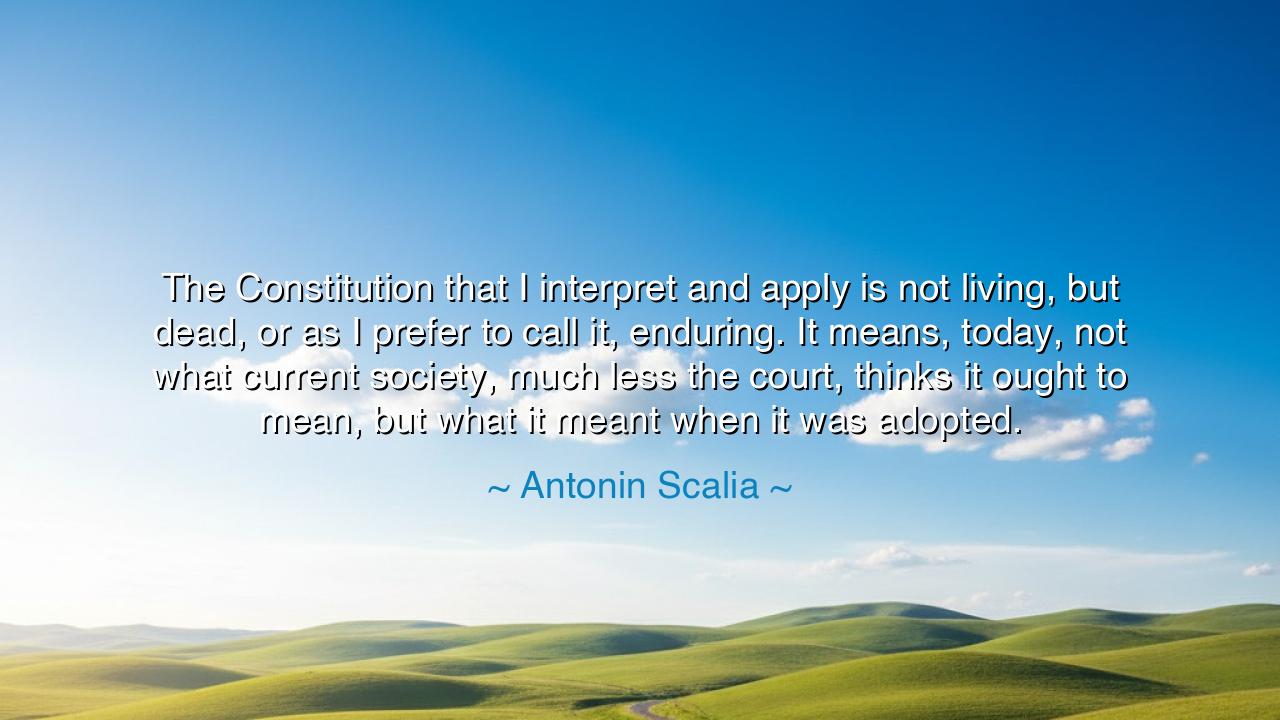
The Constitution that I interpret and apply is not living, but
The Constitution that I interpret and apply is not living, but dead, or as I prefer to call it, enduring. It means, today, not what current society, much less the court, thinks it ought to mean, but what it meant when it was adopted.






Hear now the solemn words of Justice Antonin Scalia, whose voice thundered from the bench like an oracle of ancient law: “The Constitution that I interpret and apply is not living, but dead, or as I prefer to call it, enduring. It means, today, not what current society, much less the court, thinks it ought to mean, but what it meant when it was adopted.” These words are not uttered lightly, but with the gravity of one who saw in the founding charter not a shifting wind, but a stone pillar meant to stand against the ages. To Scalia, the Constitution was not a canvas for the fashions of the moment, but a covenant, forged in the fire of history, to be honored as it was given.
The origin of this philosophy lies in the ancient belief that law must bind even the rulers, that promises made by the people’s representatives are sacred. In calling the Constitution “dead,” Scalia did not mean lifeless, but fixed—its meaning set, its words anchored, immune to the restless tides of temporary opinion. He called it enduring because its stability provides the foundation upon which liberty itself rests. If each generation reshaped its meaning to suit its own desires, then the people would no longer be governed by law, but by the will of those in power.
Consider the story of the Roman Republic. Its strength endured for centuries not because its leaders were free to twist the laws as they wished, but because they revered the mos maiorum, the customs and agreements of their ancestors. When later generations began to manipulate those laws for convenience or ambition, the Republic faltered, and tyranny emerged. Scalia’s philosophy draws from this ancient wisdom: that freedom dies when law becomes too malleable, when it ceases to bind both ruler and ruled.
Yet, his doctrine was not without controversy. Many argued for a living Constitution, one that adapts to the needs of a changing world. They said that to freeze the meaning of the charter in the age of its birth was to deny justice in the present. But Scalia countered with fire: that a “living” Constitution is but a mask for judges to impose their own will, replacing the people’s law with the court’s preference. To him, the truest protection of liberty was not in changeable interpretation, but in faithful adherence to the words as originally understood.
The meaning of his teaching is stark: that law must stand above the passions of the day. It is not the duty of the court to create justice, but to apply the covenant the people themselves have chosen. For if nine justices can alter the meaning of the Constitution at will, then the people are no longer sovereign—the judges are. To Scalia, democracy itself required that the Constitution’s meaning remain enduring, even if society sometimes grew restless with its limits.
The lesson for us is this: guard the words of your covenants. Do not twist them for convenience, nor stretch them until they lose their shape. Whether in governance, in family, or in personal vows, honor the original meaning of your promises, for their endurance is the shield of trust. To live by shifting interpretations is to stand upon sand; to live by fixed words is to build upon rock.
What then shall you do? Study the words that govern your life. If you live in a nation, know its founding charter. If you make a vow, keep it as spoken, not as reimagined later. Demand of your leaders fidelity to their oaths, not inventions of their desires. And when change is needed, let it come not through distortion, but through open amendment, by the will of the people. For change made honestly strengthens liberty, but change made by stealth corrupts it.
So let Scalia’s words echo like an ancient teaching: the Constitution, dead yet enduring. It is not the clay of today’s hands, but the stone of yesterday’s covenant. And if you would live in a land of freedom, respect the stone. Question it, debate it, even amend it—but never pretend it means what it does not. For in that pretense lies the death of law, and in the death of law, the rise of tyranny.






AAdministratorAdministrator
Welcome, honored guests. Please leave a comment, we will respond soon